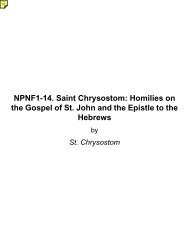Feminist Theology - The Fishers of Men Ministries
Feminist Theology - The Fishers of Men Ministries
Feminist Theology - The Fishers of Men Ministries
Create successful ePaper yourself
Turn your PDF publications into a flip-book with our unique Google optimized e-Paper software.
Systemic metaphors which endure are models. Models are not givens in the tradition.<strong>The</strong>y are open to critique, and if they fail to meet standards <strong>of</strong> helpfulness they need to bealtered or jettisoned. Some traditional models in Christianity, such as the model <strong>of</strong> God asfather, have slid over from being a model <strong>of</strong> God to being an idol. McFague writes:Among the criteria advanced for theological models are two <strong>of</strong> special significance <strong>of</strong> theissues <strong>of</strong> idolatry and irrelevance. <strong>The</strong> first is the necessity for many complementarymodels to intimate the richness and complexity <strong>of</strong> the divine-human relatioship. If thiscriterion is not accepted, idolatry results. <strong>The</strong> second is the ability <strong>of</strong> the major models <strong>of</strong>a tradition to cope with anomalies. If this criterion cannot be met, irrelevance occurs. <strong>The</strong>issues <strong>of</strong> idolatry and irrelevance come together in the image <strong>of</strong> God as father, for morethan any other dominant model in Christianity, this one has been both absolutized bysome and, in recent times, found meaningless by others. <strong>The</strong> feminist critique <strong>of</strong> God asfather centers on the dominance <strong>of</strong> this one model to the exclusion <strong>of</strong> others, and on thefailure <strong>of</strong> this model to deal with the anomaly presented by those whose expeerience isnot included in this model./8/At the end <strong>of</strong> her work on metaphorical theology, McFague suggested a new model: Godas Friend. Gender-neutral, parental models are improper, as they are too protective <strong>of</strong>humanity and do not adequately picture the cooperation <strong>of</strong> God with humans or theresponsibility which God places upon humans. Friendship is non-hierarchical andegalitarian. While friendship may have its own drawbacks, one advantage tometaphorical theology is that no one metaphor has to do everything. Deficiencies can becovered by other models.In Models for God, McFague explores what to her is the predominant model for therelationship <strong>of</strong> God and the world, the monarchical model, and after exposing itsweaknesses, she suggests several other possaibilities which address contemporaryconcerns: the world as the body <strong>of</strong> God, and God as mother, lover, and friend. Althoughthe latter three have the danger <strong>of</strong> being too individualistic and personalistic, McFaguebelieves that they best reflect the "inclusive, non-hierarchical understanding <strong>of</strong> thegospel." It should be noted that each model has implications for the branches <strong>of</strong> Christiantheology, subtly and not-so-subtly altering the various subject areas <strong>of</strong> theology.At the end <strong>of</strong> her book on metaphorical theology, McFague hinted at the subject to whichher subsequent attention turned. She wrote: "Certainly our time <strong>of</strong> desecration <strong>of</strong> thenatural environment desperately needs immanental, natural metaphors which will help toaddress the imbalance that centuries <strong>of</strong> the Judeo-Christian emphasis on humanity's'dominion over the earth' have brought about."It is to fill this need for immanental, natural metaphors that occupied her next two books,and the subject <strong>of</strong> Christian environmental understanding has occupied her last three.<strong>The</strong> model which McFague proposes is the organic model: the world as the body <strong>of</strong> God.She analyzes this from the standpoint <strong>of</strong> the traditional divisions <strong>of</strong> Christian theology:theology, Christology, anthropology, and eschatology. For her, the organic model best
















